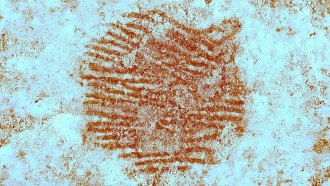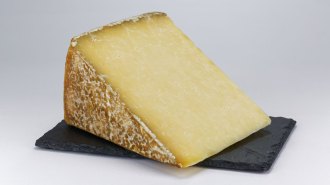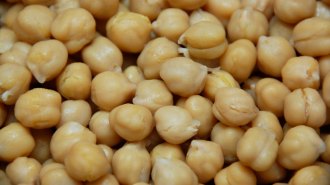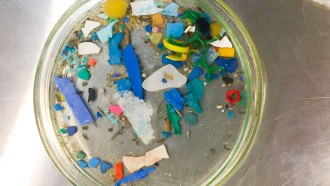All Stories
-
 Archaeology
ArchaeologyA 43,000-year-old Neandertal fingerprint has been found in Spain
An ochre dot in Spain may hold one of the oldest, most complete Neandertal fingerprints, hinting at symbolic behavior in our ancient relatives.
-
 Earth
EarthClimate change is coming for your cheese
Adapting to climate change by replacing grass in cows' feed with corn affected the nutritional value and quality of cheese, French researchers found.
-
 Physics
PhysicsHow to get the biggest splash at the pool using science
Move over belly flops and cannonballs. Manu jumps, pioneered by New Zealand’s Māori and Pasifika communities, reign supreme.
By Elie Dolgin -
 Humans
HumansFDA cuts imperil food safety, but not how you might think
Layoffs at the FDA, USDA and CDC could erode the U.S. food safety system. Experts aren’t so worried about milk or chicken today; they’re concerned about the future.
By Meghan Rosen -
 Planetary Science
Planetary ScienceA possible new dwarf planet skirts the solar system’s edge
For the dwarf planet candidate, one trip around the sun takes over 24,000 years. Its orbit challenges a proposed path for a hypothetical Planet Nine.
-
 Health & Medicine
Health & MedicineA cup of chickpeas a day lowers cholesterol
Adding a cup of chickpeas or black beans to people’s daily diets could improve health by lowering cholesterol and inflammation, a new study suggests.
By Meghan Rosen -
 Space
SpaceA private Japanese spacecraft failed on its way to the moon’s surface
The spacecraft’s owner, ispace, is attempting to land these crafts to commercialize lunar resources.
-
 Archaeology
ArchaeologyPrecolonial farmers thrived in one of North America’s coldest places
Ancestral Menominee people in what’s now Michigan’s Upper Peninsula grew maize and other crops on large tracts of land despite harsh conditions.
By Bruce Bower -
 Animals
AnimalsPreemptively cutting rhinos’ horns cuts poaching
Comparing various tactics for protecting rhinos suggests that dehorning them drastically reduces poaching.
By Jake Buehler -
 Health & Medicine
Health & MedicineA diet full of tiny plastics triggered health problems in mice
Mice exposed to polystyrene nanoplastics developed problems in their guts and livers. It’s not yet clear if humans are similarly affected.
By Meghan Rosen -
 Animals
AnimalsProbiotics helped great star corals fend off a deadly disease
A probiotic paste prevented the spread of stony coral tissue loss disease, but the treatment is still a proof-of-concept, not a cure.
-
 Earth
EarthSmall earthquakes can have a big impact on the movements of major faults
Small and far-off earthquakes can stifle the spread of large motions on some of the world’s biggest faults.
By Nikk Ogasa